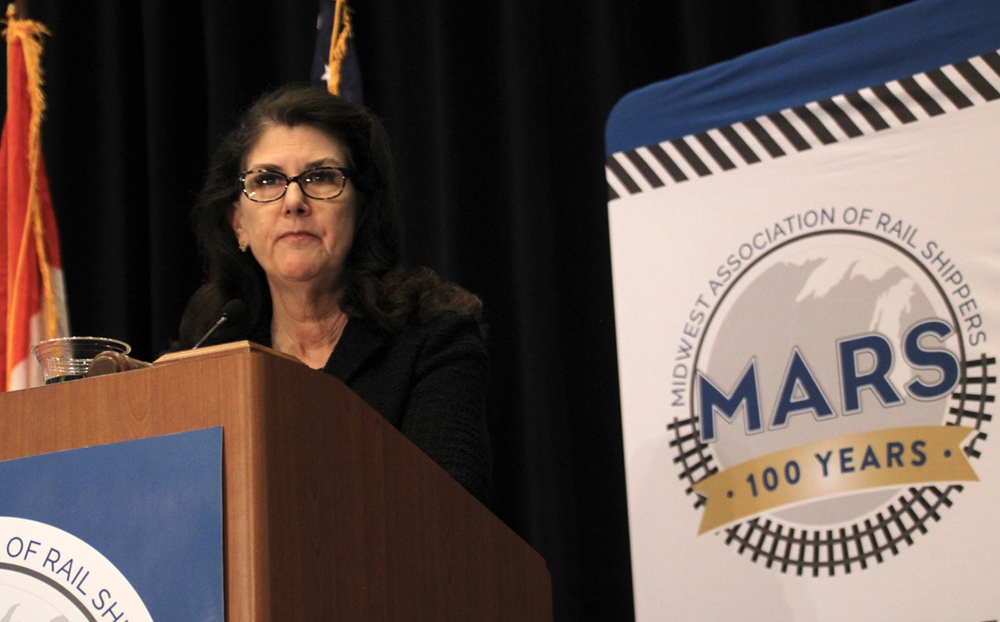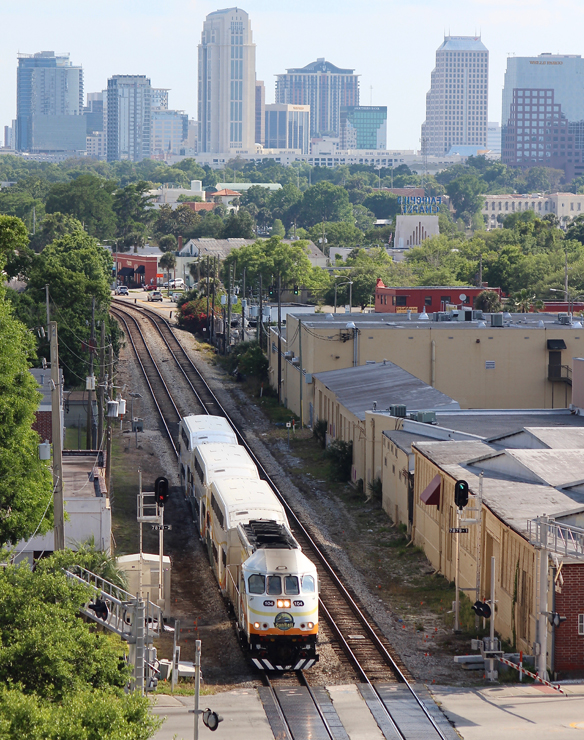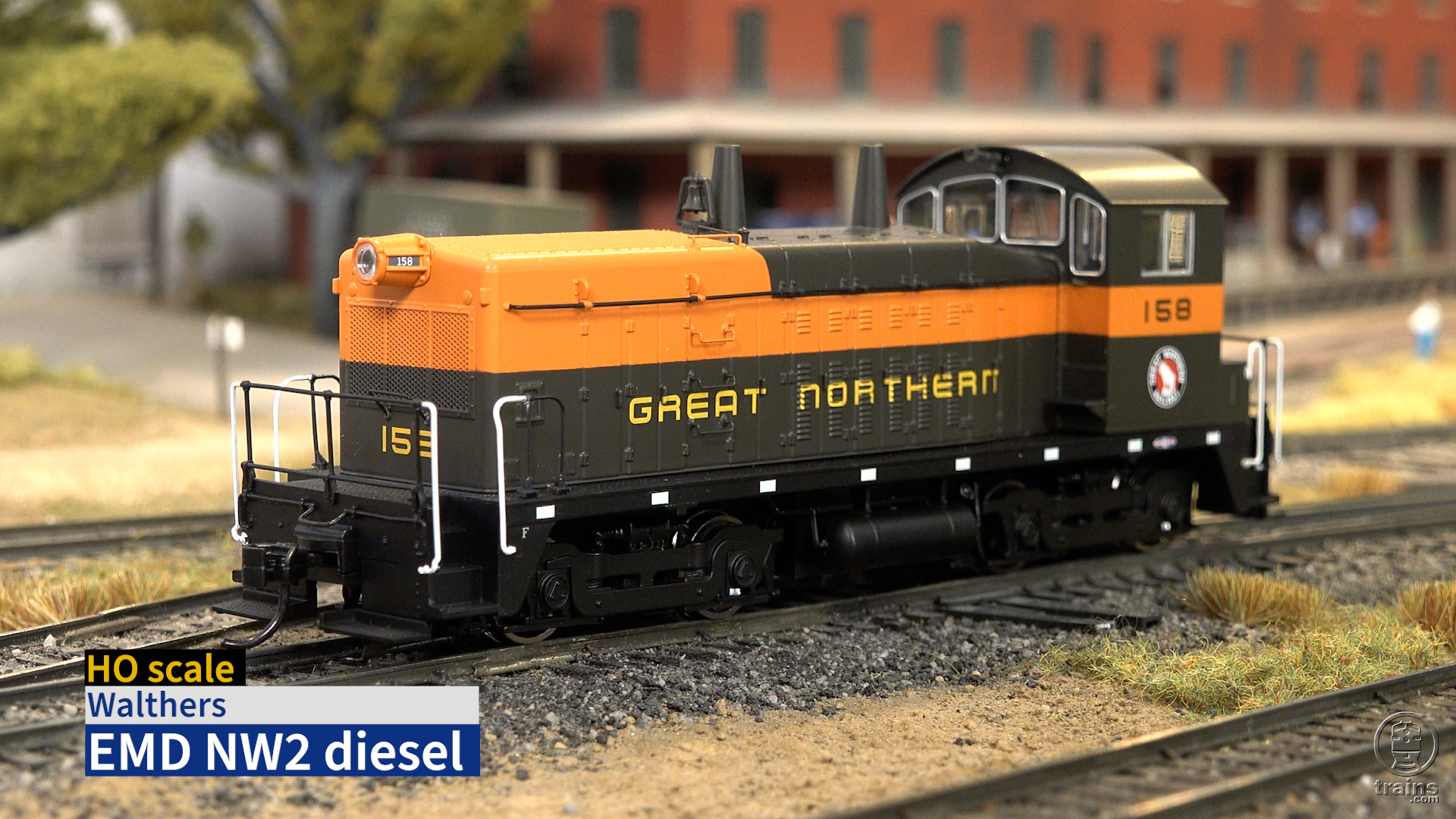
LOMBARD, Ill. — Notes from Day 1 of the Midwest Association of Rail Shippers Winter Meeting:
Border battle
Union Pacific found itself involved in headlines not of its own making in December when U.S. Customs and Border Protection shut down border rail gateways at Eagle Pass and El Paso, Texas, quickly throwing U.S-Mexico rail traffic into turmoil. The crossings reopened after four days, but a huge amount of cargo backed up on both sides of the border in the meantime.
Eagle Pass had been closed once before, in September, and UP President Beth Whited said she, CEO Jim Vena, and other officials went then to “try to understand what was happening and what CBPs concerns were with us, because make no mistake, migrants are not coming across the border on trains. I’m going to say that one more time. Migrants are not coming across the border on trains. They’re coming on the river, right? They come over the Rio Grande and they hit the ground. I think what CBP and the Department of Homeland Security have been concerned about is visuals you might see on television of people riding trains in Interior Mexico. I believe in the last, let’s call it eight weeks, we have only removed seven people from trains at border crossings. That’s not how they’re getting into the United States.”
Ferromex — of which UP is a 26% owner — has a much harder time dealing with the issue, but “has done an excellent job of trying to remove people from their trains, but what they run into kind of daily is migrants in their terminals and on their trains that they’re tasked with removing,” she said. “I believe that the Mexican government is helping them work on that, but daily, that’s hand-to-hand combat for Ferromex to keep removing people from the trains, just because it’s a steady flow.”
Whited called the flow of immigrants “a humanitarian tragedy,” but said it can’t be solved by the move that was made in December to shift a handful of CBP workers from the rail gateway to help process migrants.
“I do think the migrant crisis is real and something has to happen about that,” she said, “but shutting down the economic engine between the countries doesn’t seem like the right solution to us. And so we’re just trying to do a lot of education about what’s actually happening there and helping figuring out how we can help CBP and the Department of Homeland Security deal with issues that they’re facing.”
Association of American Railroads CEO Ian Jefferies later touched on the same issue.
“You’re costing the economy, you’re costing American businesses, you’re costing shippers, you’re costing railroads several hundred million dollars a day in economic impact for a reason that wasn’t really having a measurable impact on the issue that you were trying to address,” Jefferies said. “And so in our view it was just straight up shooting yourself in the foot at a time when you were trying to keep the economy rolling … We’ll continue to advocate strongly that that was a failed exercise.”
CSX CEO on PSR
The term “Precision Scheduled Railroading” has become the linguistic equivalent of toxic waste for most of Class I railroads — using it to describe operations guarantees an immediate, unhappy note from the media relations department at least one Class I railroad — and that’s probably especially true at a shippers’ conference.
So it’s no surprise that CSX CEO Joe Hinrichs made sure to distance his railroad from the term when asked about it during the Q-and-A portion of his appearance Wednesday — while remaining supportive of the underlying concept.
 “We don’t use the term PSR,” Hinrichs said. “It’s not in any of our vernacular at CSX. But I’m certainly aware of the term, and I did my best to try and study and learn and understand all this stuff before I joined.”(For the unaware, Hinrichs came from outside railroading, previously having been president of Ford.) “… What was striking to me was, all my experience in the auto industry and manufacturing for 30 years, we were taught for so many years about elimination of waste. It’s all about elimination of waste. If a person’s walking a little bit more than they should, that’s waste. If a person has a movement, that’s waste. It’s the same thing in railroading.
“We don’t use the term PSR,” Hinrichs said. “It’s not in any of our vernacular at CSX. But I’m certainly aware of the term, and I did my best to try and study and learn and understand all this stuff before I joined.”(For the unaware, Hinrichs came from outside railroading, previously having been president of Ford.) “… What was striking to me was, all my experience in the auto industry and manufacturing for 30 years, we were taught for so many years about elimination of waste. It’s all about elimination of waste. If a person’s walking a little bit more than they should, that’s waste. If a person has a movement, that’s waste. It’s the same thing in railroading.
“What scheduled railroading was about was really about the elimination of waste. … It became this other thing that hedge funds and other people promoted, but if you to back to the five core principles originally established in the books that CN put out with Hunter [Harrison] and the gang. It was about safety,improvement, control costs, asset utilization, customer service, and employees. Now I would say they got really good grades on the controlling costs, asset utilization, and Fs on employees and customers. But you can’t argue with those five things. There’s nothing wrong with that.
“So the core principles, scheduling as they were described by people that started it, there’s nothing wrong with that, but you’ve got to have ’em in balance. So for us, it’s about lean thinking. It’s about eliminating waste.”
Investing in (and with) consistency
Norfolk Southern has made it clear it’s moving away from the traditional boom-and-bust, hire-and-furlough approach to employment. CEO Alan Shaw said the railroad is taking a similar long view to capital investment.
“There are things that I know that we’re going to need five years from now, 10 years from now,” he said. “It’s not going to surprise anybody, but it’s track infrastructure, it’s intermodal facilities to help us compete with truck, its merchandise railcars to help us compete with truck, it’s our yard offices. ….
“Instead of just cutting and investing aggressively in good times, where we miss opportunities, what we’ve decided to do is take a balanced approach. Where do we need to be five years from now, 10 years from now, and just snap a string line, and then just consistently invest year in and year out.
“Ultimately, you don’t need any more resources. You’re actually going to be more efficient. You’re lot more efficient at installing rails, ties, and ballast if you do the same amount every single year, instead of ramping it up and ramping it down. And so proven reliable, consistent, investments over time in those strategic assets —which includes our people — is actually a great way to drive productivity and efficiency.”














Agree with Mr. Richards comments above and I would go further to say the President should be impeached because his “open borders” policies endanger U.S. national security (drugs, potential terrorism, etc.).
Ensuring national security and defense is a key responsibility of the President of the United States and Joseph R. Biden has failed miserably in this. He should be gone! Sent back to Delaware ……
Closing the border to trade is the same thing as putting trade sanctions on Mexico without cause. That is an act of war and the POTUS needs to be impeached because he’s unfit to hold office as Commander in Chief.
Biden is the worst president in US history. He makes James Buchanan seem insightful, Warren Harding look honest, and Woodrow Wilson seem like a nice man.
Frighteningly, the man running against him isn’t much better.
Twenty-five percent of Americans hate Biden. Twenty-five percent of Americans hate Trump. That leaves the fifty percent who hate them both. Put me in the latter category.